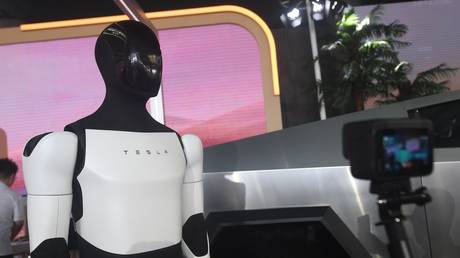Some Gen Zers — or those defined as born between 1997 and 2012 — feel they are being undervalued at work.
Getty Images
Gen Zers can face workplace challenges due to a perceived lack of experience and high demands.Experts argue Gen Z’s behavior is shaped by missing formative years during the COVID-19 pandemic.Abandoning Gen Z talent is short-sighted, experts warn.
Gen Zers have long been portrayed to be lazy, entitled, and overly demanding.
Newsweek labeled Zoomers “toxic for companies,” while the BBC reported they are the cohort that “want it all” — career progression, fair pay, and a work-life balance.
The Wall Street Journal, citing surveys, said that companies find the youngest employees the most difficult to work with. Business Insider has also reported on Gen Zers bringing parents to job interviews, being fired in their first few weeks of work, and bosses perceiving this cohort as lazy.
The jury is still out over whether these negative stereotypes hold true. But many Gen Zers don’t agree with them, and some even believe they are holding them back at work.
Whether the stereotypes of Gen Z are fair not not, workplace experts warn that giving up on Zoomers so early is a mistake.
They say judging young talent on their behavior, which may have been partly impacted by missing out on several formative years due to the COVID-19 pandemic, is shortsighted. Some stereotypes may be rooted in accuracy, but Gen Zers should be cut more slack, they say.
“This is soon going to be the largest cohort in the American workforce,” Richard Wahlquist, the CEO of the American Staffing Association, told BI. “So it’s not just an investment in today, it’s the reality of our future for years to come.”
The real-world impact
Gen Zers who spoke to BI said they felt unsupported in the workplace and unfairly targeted.
Max Jones, a 21-year-old graduate trainee, told BI that he and his friends feel like they are “made to seem lazy or not trying hard enough” at work. He said this feeling wasn’t specific to any one company, but anywhere he interacted with older people in a professional capacity, he felt “a general vibe.”
Shriya Boppana, 25, left her job to pursue an MBA because she felt she had been unjustly denied bonuses and promotions at TKTK
“I’ve had managers in the past judge me for not having furniture in my new apartment,” Boppana told BI, adding that they would “blame it on me being Gen Z and how we’re just lazy.”
Boppana said managers also stalked her social media and told her she should be “spending more time at work” than posting on Instagram.
Aquayemi-Claude Akinsanya, 26, told BI that in the workplace, Gen Zers are often assumed to lack dedication or a strong work ethic.
“This can be especially frustrating when my passion for education and my commitment to my projects and task at times are overshadowed by systematic and narrow thinking stereotypes,” Akinsanya said.
Akinsanya also didn’t find this experience occurred at just one company but “across various settings.”
“I’ve often found myself reflecting on the balance between personal values and the corporate structures that sometimes challenge them,” he said.
Stunted experiences
Many Gen Zers started their careers in a remote environment during the pandemic and missed the opportunity to observe the unwritten rules of workplace etiquette.
One millennial manager told BI they thought their Gen Z employees crossed professional boundaries as a result, particularly when it came to complaining about work.
“They’re unsure of how to cope with everyday challenges — competing deadlines, interpersonal issues, and receiving feedback — and they want to express that,” the millennial manager said.
Rhea Moss, the director of customer experience and data insights at iCIMS, told BI that Gen Z was disrupted by a traumatic global event, the impacts of which some workplaces just don’t consider.
“This group probably had fewer internships when they started, maybe right out of school,” Moss said. “They didn’t get that normal learning-through-osmosis experience in an office.”
Zoomers are entering the workplace at a time when everyone is still figuring things out, she said, while being expected to naturally slot into it.
ones told BI he believes the pandemic “played a massive role” in this disconnect between workplaces and Gen Zers, with missing out on a year or more of direct contact.
“This is mostly shown in our confidence around the workforce,” he said, such as a fear of getting something wrong or speaking up.
“This was most notable at uni, where in my first lecture, nobody spoke to each other,” he said. “It was like we had forgotten to communicate or were afraid to speak.”
Chloe Combi, a researcher, speaker, and author of “Generation Z: Their Voices, Their Lives,” told BI that Gen Zers have also grown up in a schooling and parenting system that is “very handholding” and “prescriptive.”
“The modern education system and modern parenting are completely geared toward the kind of maximum comfort and solving problems for young people,” Combi said.
All these factors create “a perfect storm of psychological issues,” Combi said, and a lack of experience coming into the professional workplace.
The long-term goal
This isn’t the full story. Wanting a better work-life is not a crime, and a workplace reckoning that focuses more on balance and flexibility has been a long time coming, some experts argue.
Gen Zers do have high standards, but that can be a good thing, Jeanie Y. Chang, a licensed clinician, speaker, and mental health educator, told BI.
To sidestep the looming “Great Detachment,” it might be time for employers to start listening to their young talent, especially when it comes to mental health.
Chang said Gen Zers prioritize companies that offer perks such as mental health days and wellness workshops.
“That’s probably where some feel like they’re not being invested in because that’s not available,” she said. “A lot of my job is going to the older generations and saying, yes, it is important. Your mental health, your wellness, is important.”
Chang warns companies to start investing in these things, “or you’re not going to have a workplace.”
Chang also reminds executives that they are going to want to retire, so investing in the Gen Z workforce now is going to make passing the torch much easier later on.
Some companies are already doing this and making themselves attractive to Gen Z talent. Nike, for example, has invested in mental health perks, such as offering 20 free therapy or coaching sessions, Forbes reported.
According to Morning Brew, Chipotle has also taken note and offers mental health support. The company also matches up to 4% of employees’ salary through 401(k) contributions if they have student loan payments and has a program to help people build credit.
Wahlquist said one major plus for hiring young people is that Gen Zers “just get” the benefits of going into the office, especially at a time when some companies are keen on bringing their staff back.
Maggie Angevine, Wahlquist’s colleague and a public relations coordinator at the ASA, is a Gen Zer herself. She told BI that she and many of her friends appreciate the office setting because they spent a lot of their college time, and even some internships, online.
“I’d never been in an office before, and the majority of my peers had also never been in an office,” she said. “We all really like it.”
Sponsors and mentors are the answer
The answer to the disconnect between Gen Zers and their employers lies in sponsorship and mentorship, Chang said, both of which are important.
A mentor is someone higher up the chain who listens and can give advice, like a counselor. A sponsor advocates for you.
“The sponsor is the one that actually takes action and even takes a risk,” Chang said. “That’s very much needed with this young generation.”
Every generation can learn from every other in the workplace, whether it’s the wisdom passed down from boomers or the digitally native skills of Gen Z.
Moss said businesses claim they want to hire Zoomers, but to do so successfully they need to understand they can’t assimilate young talent into the company the same way they would someone with 15 years of experience.
“That is where there is a struggle,” she said. “They’re trying to bring that talent in and figure out how to push them through a process that wasn’t necessarily built for this day and age.”





+ There are no comments
Add yours